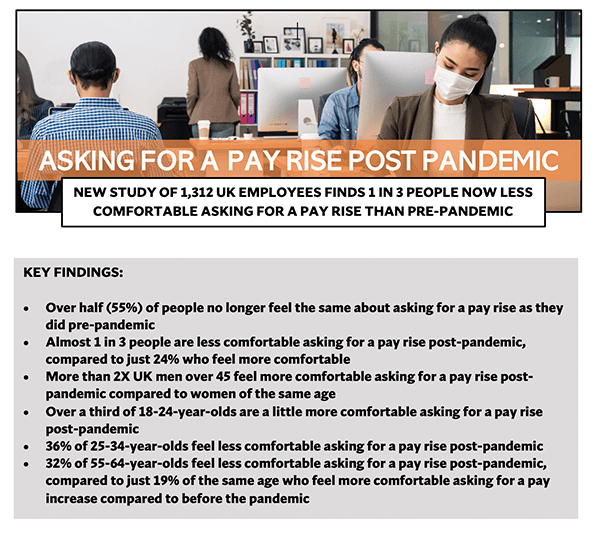New research of 1,312 UK employees, undertaken by leading business energy retailer Love Energy Savings, has revealed a huge shift in the way UK employees feel about asking for a pay rise, from now compared to pre-pandemic.
COVID-19 has had an enormous impact on the UK economy and on those who work to power it.
It has changed the way we work and rolled the dice for many employees, who now either work for a company that has fallen on harder times or one that has felt the benefits of a nation in lockdown.
Consequently, employees’ sense of financial self-worth and trust in employer’s financial health has altered, creating worrying division between both genders and age demographics.
The Findings
The survey revealed that over half (55%) of people no longer feel the same about asking for a pay rise as they did pre-pandemic.
Just under a third now feel less comfortable asking their employer for a pay rise, while only 24% feel more comfortable.
Perhaps workers feel – given how many companies have gone under this year – that they are simply lucky to have a job and shouldn’t give their employers a reason to let them go.
The Confidence Gap
Love Energy Savings’ research revealed that the younger generation have emerged feeling more confident asking for a pay rise post-pandemic than the more seasoned employees.
Just under a third (32%) of those aged 55-64 feel less comfortable asking for a pay rise compared to before the pandemic, with only 19% feeling more confident.
This is in stark contrast to Generation Z, with 29% feeling significantly more comfortable asking for a pay rise than they did pre-pandemic.
The Gender Divide
It seems as though this gap in confidence extends to gender, with the data revealing that men aged 45-54 were 55% more likely to feel more comfortable asking for a pay rise post pandemic compared to women.
We asked Lorri Rassas, SPHR-certified Human Resources consultant and author for her take on the data:
“There are definitely historical factors to consider here. While there have been some slight improvements, a lot of research has shown that women tend to be less effective negotiators than men.
“In some cases employers say that women earn less because they ask for less. Further research suggests that women are more likely than men to take the first offer that is made to them, while men are more likely to counter an employer’s initial offer.”
Forecast for the future
We asked Lorri what her thoughts were for the future of employees asking for a pay rise:
“Employers are mapping out designs for their post-pandemic workforce, but those plans may change depending upon how others react to them. If an employer requires all employees to return to work on-site and this causes a mass exodus of top talent, the employer may reconsider.
“Similarly, if an employer agrees to give its employees the ability to work remotely and their clients start to complain, then that employer will likely have to make some difficult decisions. Based on this pervasive uncertainty, it makes sense that employees are laying low and treading carefully before making any demands.”
However, when referring to the split in those wishing to work from home vs in the office, she continues:
“If these divergent views continue to surface, while the number of fully remote jobs shrink and the demand for them continues to rise, then those who secure those jobs will probably be less likely to be aggressive in asking for a raise because they will not want to risk alienating an employer who is giving them the flexibility they desire.
“The global pandemic was a gigantic work-from-home experiment, but the experience is not over, and the results are not yet in”.

Author bio: Eve Crabtree works as a PR Executive for several brands in the energy industry. She focuses on educating businesses on the best ways to reduce their energy costs by offering advice and top tips. She also explores HR and employee-focused topics to highlight the benefits of a diverse, inclusive, and supportive work environment.
PhPhoto Credits: Pixabay




